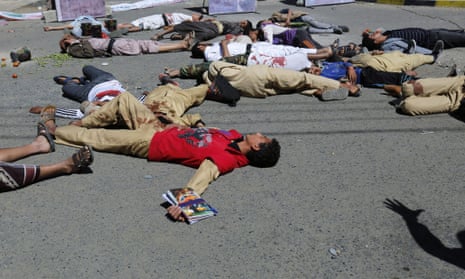“The nuclear deterrent”, Michael Fallon, the defence secretary, told BBC 4’s Today programme on Tuesday, “is at the heart of our defence”. He was responding to criticism directed at General Sir Nicholas Houghton, Britain’s most senior military officer.
In a clear reference to the Labour leader, Jeremy Corbyn’s, admission that, if he were prime minister, he would never order the commander of a Trident submarine to fire a nuclear weapon, Houghton said: “I would worry me if that thought was translated into power.”
Though he did not mention Corbyn by name on the BBC’s Andrew Marr Show, Houghton said that position undermined the credibility of deterrence.
On the same morning Fallon was defending Houghton and Britain’s nuclear weapons, Robert Hannigan, director of GCHQ, warned a private conference in London about the growing threat of serious cyber attacks.
“Those charged in government with national security have worried about the top end threats for some time...there is no doubt signficant cyber attacks will become more common, not less in the coming period”, he is reported to have said.
British targets were being attacked 200 times a month, double the rate a year ago, according to GCHQ. Russia in particular is reported to getting more aggresssive.
Ciaran Martin, head of cyber security at GCHQ, was reported as saying: “These are attacks that are of significance to national security. That is either because of who the aggressor or the victim is or because of the nature of the attack.”
Senior defence officials say privately - and unsurprisingly - they are most worried about cyber attacks and terrorism - and also the lack of such conventional capabilities as maritime surveillance aircraft - but certainly not nukes.
How much the real threats to Britain’s national security will be reflected in the forthcoming Strategic Defence and Security Review (SDSR) due to be revealed on 23 November, remains to be seen.
It will be interesting, given George Osborne’s lead role in the exercise, whether the Treasury has been persuaded that spending billions of pounds on Trident renewal, aircraft carriers, and expensive planes to fly from them, are as useful investments as spending a fraction of the sum on intelligence - £1.25bn a year to 2020 - on a “joint security fund”.
The SDSR is expected to say that one priority will be Britain’s future relations with Gulf states.
Philip Dunne, the UK’s arms procurement minister, made clear at the recent Dubai air show, the Middle East’s biggest, that the Gulf region would feature prominently in the SDSR.
Britain is strengthening its intelligence-sharing relationships with authoritarian Gulf states, and Bahrain is building a naval base for British warships.
But Britain’s rellations with its biggest ally in the Gulf , and biggest arms market - Saudi Arabia - may be coming unstuck. The sale of 40-plus Eurofighter Typhoon aircraft is stalled (the Typhoon has got new order since 2012 , while its French rival, the Rafale, has been bought by Egypt, Qatar, and India).
In a letter to the Daily Telegraph last month, Prince Mohammed bin Nawaf bin Abdulaziz Al Saud, the Saudi ambassador to Britain, defended his country against recent attacks on its human rights record. He also criticised the decision to cancel a British government contract to advise the authorities in Saudi Arabia on prison reform.
“If the extensive trade links between the two countries are going to be subordinate to certain political ideologies, then this vital commercial exchange is going to be at risk”, he warned.
It was a significant intervention. So, too, were the comments made by Philip Hammond, the foreign secretary, during BBC2’s Newsnight programme on Tuesday night.
“The Saudis deny that there have been any breaches of international humanitarian law,” said Hammond referring to Saudi aircraft striking targets in Yemen with British Paveway bomb.
He added: “Obviously that denial alone is not enough. We need to see proper investigations. We need to work with the Saudis to establish that international humanitarian law has been complied with. We have an export licensing system that responds if we find that it is not. We will then find that we cannot licence additional shipments of weapons.”
Andrew Smith of Campaign Against Arms Trade said: “The Gulf states have appalling human rights records, particularly Saudi Arabia, yet they are always the key focus for UK arms sales. Despite the cancellation of the Saudi prison contract, and despite the horrors being unleashed on the people of Yemen by UK arms, there is growing talk of David Cameron visiting the regime to apologise and make up.”

Comments (…)
Sign in or create your Guardian account to join the discussion